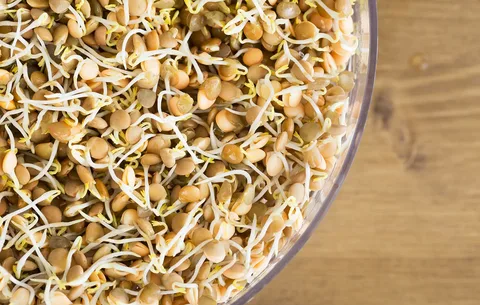Exploring the Health Benefits of Sprouted Grains and Legumes
Sprouted grains and legumes have gained popularity in recent years due to their potential health benefits and increased nutrient content. The sprouting process involves soaking and germinating grains and legumes until they sprout tiny shoots. This transformation can enhance their nutritional profile and make certain nutrients more accessible to the body.
Enhanced Nutrient Absorption
During sprouting, enzymes are activated, which can break down complex carbohydrates, proteins, and fats into simpler forms. This process increases the bioavailability of nutrients, such as vitamins, minerals, and antioxidants, making them easier for the body to absorb and utilize.
Increased Protein Content
Sprouting can increase the protein content of grains and legumes as the germination process initiates protein synthesis. This makes sprouted grains and legumes an excellent source of plant-based protein, making them suitable for vegetarians and vegans.
Improved Digestibility
Sprouting reduces the presence of anti-nutrients, such as phytic acid and enzyme inhibitors, which can interfere with nutrient absorption and digestion. By neutralizing these compounds, sprouted grains and legumes become easier to digest, reducing the likelihood of gastrointestinal discomfort.
Lower Glycemic Index
Sprouted grains and legumes tend to have a lower glycemic index compared to their non-sprouted counterparts. This means they cause a slower and more gradual increase in blood sugar levels, which can help regulate blood sugar and insulin levels, making them suitable for individuals with diabetes or those looking to manage their weight.
Increased Fiber Content
The sprouting process can increase the fiber content of grains and legumes, promoting digestive health and regular bowel movements. High-fiber diets have been linked to a reduced risk of various chronic diseases, including heart disease, diabetes, and certain types of cancer.
Rich in Antioxidants
Sprouted grains and legumes are rich in antioxidants, compounds that help protect cells from damage caused by free radicals. Antioxidants play a crucial role in reducing inflammation, supporting immune function, and preventing chronic diseases.
How to Incorporate Sprouted Grains and Legumes into Your Diet
Sprouted grains and legumes can be incorporated into a variety of dishes, including:
- Salads: Add sprouted grains or legumes to salads for extra texture and nutrition.
- Soups and Stews: Use sprouted grains and legumes as a nutritious addition to soups and stews.
- Baked Goods: Substitute sprouted grain flour for regular flour in baking recipes for a healthier alternative.
- Smoothies: Blend sprouted legumes or grains into smoothies for an added protein and fiber boost.
FAQs
Are sprouted grains and legumes gluten-free?
Sprouted grains such as sprouted rice, quinoa, and millet are naturally gluten-free. However, some sprouted grain products may contain gluten if they are made from wheat or barley. It’s essential to check the label for gluten-containing ingredients if you have a gluten sensitivity or intolerance.
Can I sprout grains and legumes at home?
Yes, you can sprout grains and legumes at home using simple techniques. Soak the grains or legumes in water for a specified time, then drain and rinse them at regular intervals until they sprout. There are many online resources and tutorials available to guide you through the process.
Are sprouted grains and legumes suitable for everyone?
While sprouted grains and legumes offer many health benefits, some individuals may experience digestive discomfort or allergic reactions. It’s essential to listen to your body and consult a healthcare professional if you have any concerns or underlying health conditions.
Can sprouted grains and legumes be eaten raw?
Yes, sprouted grains and legumes can be eaten raw, although they may be more palatable when cooked. Cooking can also help neutralize any remaining anti-nutrients and improve digestibility.
Are sprouted grains and legumes more expensive than non-sprouted varieties?
Sprouted grains and legumes may be slightly more expensive than non-sprouted varieties due to the additional processing involved. However, the increased nutrient content and potential health benefits may justify the higher cost for some individuals.
Can sprouted grains and legumes help with weight loss?
Sprouted grains and legumes are nutrient-dense, high in fiber, and protein, which can promote satiety and aid in weight management. However, weight loss is influenced by various factors, including overall diet and lifestyle habits.
Are there any potential drawbacks to consuming sprouted grains and legumes?
While sprouted grains and legumes offer numerous health benefits, some individuals may experience digestive issues or allergic reactions. Additionally, sprouted grains and legumes are perishable and should be stored and handled with care to prevent foodborne illness.
Conclusion
Sprouted grains and legumes are nutrient-dense, versatile ingredients that offer numerous health benefits. From enhanced nutrient absorption to improved digestibility and lower glycemic index, incorporating sprouted grains and legumes into your diet can support overall health and well-being. Whether added to salads, soups, or baked goods, sprouted grains and legumes are a delicious and nutritious addition to any meal. By understanding their health benefits and how to incorporate them into your diet, you can reap the many rewards of these wholesome ingredients.
- Neauvia Hydro Deluxe Skin Booster Treatments Near Chertsey, Surrey - May 9, 2025
- Lip Flip Treatment Near Long Ditton, Surrey - May 8, 2025
- Downturned Smile Treatment Near Fetcham, Surrey - May 6, 2025

